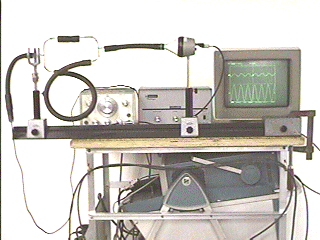

PURPOSE: To demonstrate interference of sound waves in a perhaps surprising way.
DESCRIPTION: An oscillator, with its output displayed on the lower trace of the oscilloscope, is attached to a speaker such that the sound is introduced into one end of a tube through a funnel. A microphone is inserted into the other end of the tube with its output shown on the upper trace of the oscilloscope. The tube between the speaker and the microphone splits into two paths, one being about 50 cm longer than the other. At a frequency of about 350 Hz, the waves from the two separate paths are out of phase when they recombine, so the signal reaching the microphone is a minimum. Pinching the longer tube removes one-half of the signal, yet the amplitude at the microphone increases. This may seem to be a surprising result! As the frequency is increased, values will be found where the waves from the two paths are alternately in and out of phase, yielding a series of maxima and minima in the recombined signal.
SUGGESTIONS: Pre-set this device at a nodal point, so that when you stop the longer tube by squeezing, the signal at the microphone increases in amplitude, and let your students try to explain it.
REFERENCES: (PIRA 3B55.40)
EQUIPMENT: Quincke's tube, small loudspeaker, and microphone mounted on optical rail, oscillator, amplifier, and dual trace oscilloscope.
SETUP TIME: 10 min.
 |  |  |  | 
|